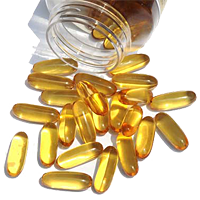Fish Oil
Fish Oil Overview
[ad] Empty ad slot (#1)!
Oil that has been derived from oily fish tissues is known as fish oil. Fish oils contain DHA also known as docosahexaenoic acid and EPA also known as epicosapentaenoic acids which are omega 3 fatty acids, and there are a number of fish oil benefits associated with improved health such as decreasing inflammation of the body and lowering blood pressure, improved episodes of mental health and additional health benefits.
Omega-3 fatty acids are not produced by fish but fish accumulate these oils by consuming prey that have accumulated these oils from consuming microalgae or by consuming microalgae that produce omega 3 fatty acids as with fish such as sardines or herring. Predatory fish such as albacore tuna, tilefish, sword fish, and shark may have high levels of omega 3 fatty acids because these fish are high on the food chain, they may also accumulate toxic substances. The FDA has recommended limiting the consumption of certain types of predatory fatty fish (swordfish, shark, albacore tuna, etc.) for this reason because of their high degrees of toxic contaminants such as chlordane, PCBs, dioxin, and mercury.
Fish Oil Health Benefits
1. Cancer. There have been various possible anti-cancer effects when the Omega-3 fatty acids that are found in fish oil have been consumed. Particular fish oil benefits were in the areas of prostate, colon and breast cancer. Omega 3 fatty acids increased genetically engineered mice survival rates, reduced the rate of histopathological progression, and decreased the growth of prostate cancer. In a study done using 35,000 women who were middle aged, a publication in the journal Cancer Epidemiology sited that participants who consumed fish oil supplements experienced 32 percent reduced risk of breast cancer, however the authors also indicated the results from this study were also preliminary and there should not be conclusions drawn from the relationship between the two. Other oils that contain omega-3 fatty acids are macadamia oil, flaxseed oil, sunflower oil, safflower oil.
2. Cardiovascular. There are 3 conditions for which fish oil benefits are listed by the United States National Institutes of Health site ting that fish oil and additional omega 3 sources are greatly recommended for which are high blood pressure, the prevention of secondary cardiovascular disease, and hypertriglyceridemia. For cardiovascular disease, the AHA recommends taking one gram of fish oil per day, preferably in the form of eating fish, for individuals that have coronary heart disease.
3. Mental Health. Some studies of fish oil benefits that were published indicate that fish oil consumption may decrease the risk of suicide and depression. One of these studies which involved blood samples taken from 100 patients that attempted suicide, compared the findings with that of controlled samples, and found that EPA levels were significantly less of the suicide attempt patients in the washed red blood cells.
4. The prevention of artery hardening is another health. Additional benefits of this oil include omega three fatty acids may help individuals overcome and prevent a number of inflammatory conditions. This means that this oil could result in decreased amounts of pain associated with sinusitis, prostatitis, cystitis, bursitis, tendonitis, arthritis and more.
5. Consuming a good quality of omega-3 pure supplements have resulted in some adults noticing their children experience a decrease in aggressive behavior, preventions in learning disabilities, improvements in school grades, and an overall improvement of IQ. Some other fish oil health benefits noticed by kids include improvements in motor skills, hearing, vision, better coordination with sports and improvements to personality.
6. Additional health benefits include PMD symptom reduction. Some people have even stated fish oil improved fertility and the regulation of the monthly cycle in women.
Types of Fish Oil
There are basically 3 types of fish oil; cod liver oil, health food grade, and pharmaceutical grade.
1. Cod Liver Oil
This oil in high dosages is not recommended because it has high levels of contaminants and Vitamin A. This oil is low quality.
2. Health Food Grade
This oil is better quality and comes from a certain species of fish such as salmon. These oils typically have very poor taste and it is this reason they are usually sold in soft gelatin capsules.
3. Pharmaceutical Grade
This oil is ultra refined and is the highest quality oil. The certification process by which this type of oil is made uses the most up to date technology in order to measure contaminants.
[ad] Empty ad slot (#1)!
Fish Oil Overview | Fish Oil Health Benefits | Types of Fish Oil
